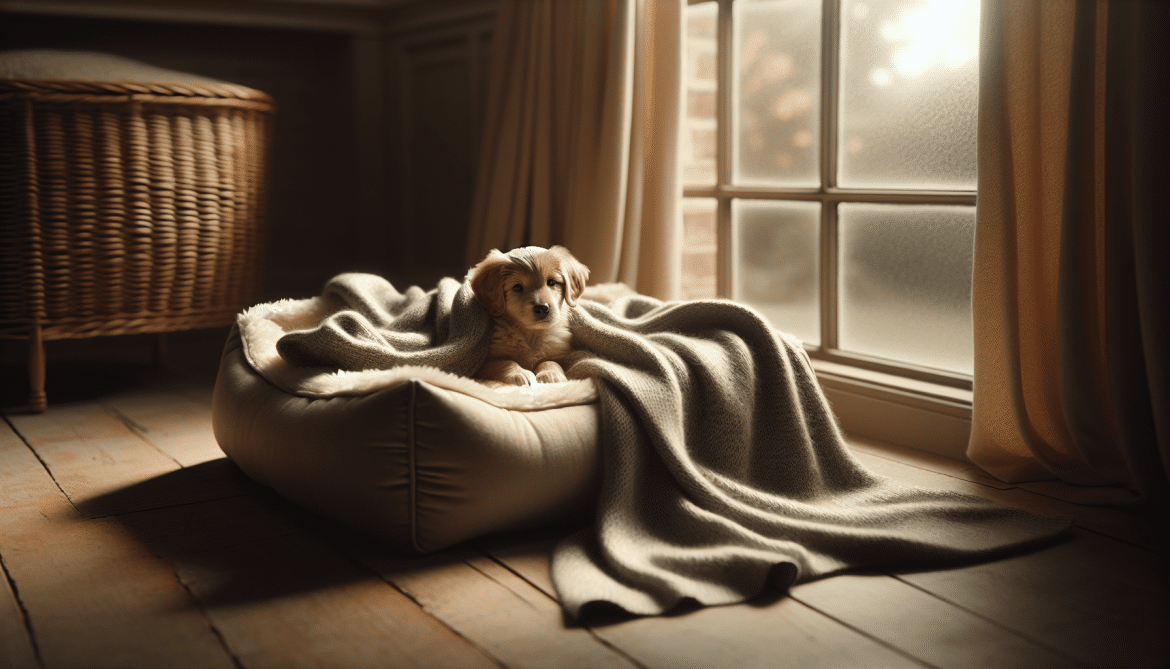Imagine cuddling up in a cozy blanket at night, finding comfort and warmth as you drift off to sleep. As humans, we instinctively seek out these creature comforts, especially during colder nights. But have you ever wondered if our furry companions, specifically puppies, need blankets at night too? You might be surprised to learn that these adorable bundles of fur may actually benefit from the added warmth and security of a blanket during their slumber. In this article, we will explore whether puppies get cold at night and if providing them with blankets is necessary to ensure their comfort and well-being.

This image is property of images.pexels.com.
Importance of Blankets for Puppies
Providing Warmth
Blankets play a crucial role in providing warmth to puppies, especially during the colder months. As young, developing animals, puppies are more susceptible to cold temperatures and may struggle to regulate their body temperature effectively. By providing a cozy and insulated blanket, you can ensure that your furry friend stays warm and comfortable throughout the night.
Comfort and Security
Just like humans, puppies seek comfort and security in their sleeping environment. A soft and cuddly blanket can offer them the reassurance they need, giving them a sense of familiarity and coziness. The presence of a blanket can help alleviate any anxiety or stress your puppy may experience, providing them with a safe and soothing place to rest.
Mimicking the Mother's Presence
For puppies, warmth and comfort are synonymous with their mother's presence. In the early stages of their lives, puppies rely heavily on their mother for warmth and security. By using a blanket, you can simulate the feeling of being nestled against their mother, helping them feel safe, loved, and protected.
Factors to Consider
Breed and Age
Different breeds and age groups have varying tolerance levels for temperature. Smaller and younger puppies, such as toy breeds or those with short hair, may feel colder more easily due to their higher surface-area-to-volume ratio. Consider your puppy's breed and age when deciding on the best blanket options to ensure their specific needs are met.
Room Temperature
The ambient temperature of the room your puppy sleeps in also plays a significant role in their comfort. If you live in a colder climate or tend to keep your home on the cooler side, your puppy may require additional warmth from a blanket. On the other hand, if the room is already adequately heated, a lighter blanket may be sufficient.
Coat Length and Thickness
The length and thickness of your puppy's coat should be taken into account when selecting a blanket. Breeds with shorter hair or minimal undercoats may benefit from thicker blankets that provide additional insulation. Conversely, puppies with thicker, longer coats may prefer lighter blankets that allow for better air circulation, preventing them from overheating.
Sleeping Habits
Observing your puppy's sleeping habits can give you valuable insights into their blanket preferences. Some puppies prefer to burrow under blankets, snuggling up in a cozy den-like space. Others may prefer a more open sleeping arrangement, simply curling up on top of a blanket for added comfort. Understanding your puppy's sleeping habits will help you choose the most suitable blanket style.
Benefits of Using Blankets
Regulating Body Temperature
Blankets assist puppies in regulating their body temperature by providing an extra layer of insulation. Just as humans use blankets to stay warm during the night, puppies can utilize them to stay cozy and comfortable. A well-regulated body temperature is vital for maintaining proper health and promoting restful sleep.
Preventing Hypothermia
Puppies are susceptible to hypothermia, especially during the colder months or if they are exposed to low temperatures for extended periods. A blanket acts as a protective barrier, helping to retain body heat and insulate your puppy against the cold. By using a blanket, you can minimize the risk of hypothermia and ensure your puppy stays warm and healthy.
Reducing Stress and Anxiety
Puppies, like all animals, can experience stress and anxiety. The introduction of a familiar and comforting blanket can provide a sense of security and help alleviate these negative emotions. By creating a soothing environment with the help of a blanket, you can significantly reduce your puppy's stress and anxiety levels, promoting overall well-being.
Choosing the Right Blanket
Material and Insulation
When selecting a blanket for your puppy, consider the material and level of insulation it provides. Opt for fabrics that are soft, gentle on your puppy's delicate skin, and easily washable. Fleece, cotton, or microfiber blankets are often great choices, as they offer warmth without causing overheating.
Size and Thickness
The size and thickness of the blanket are crucial factors to consider. Choose a blanket that is large enough for your puppy to comfortably curl up or stretch out on without feeling cramped. The thickness should strike a balance between providing adequate insulation and allowing for proper air circulation to prevent overheating.
Ease of Cleaning
Considering the inevitable messes that come with owning a puppy, it's important to choose a blanket that is easy to clean. Opt for machine washable blankets that can withstand frequent laundering without losing their softness or shape. This will ensure that you can easily maintain a clean and hygienic sleeping environment for your furry friend.

This image is property of images.pexels.com.
Alternative Options to Blankets
Heated Pads and Mats
If you live in an exceptionally cold climate or your puppy requires extra warmth, heated pads or mats can be a viable alternative to blankets. These specialized heating devices provide a regulated amount of warmth, keeping your puppy cozy without any risk of overheating. However, it is crucial to follow the manufacturer's instructions and ensure the pad or mat is pet-safe.
Warm Clothing and Sweaters
In addition to blankets, warm clothing and sweaters can be used to keep your puppy snug during colder periods. These garments come in a variety of sizes, designs, and materials, allowing you to choose the most suitable option. However, it is important to supervise your puppy when they are wearing clothing and remove it if any signs of discomfort or restriction are observed.
Common Concerns
Overheating
While blankets are essential for providing warmth, it's important not to overdo it. Puppies can easily become overheated if the room temperature is too high or if they are layered with excessively thick blankets. Monitor your puppy's behavior and body temperature to ensure they are comfortable and not showing signs of overheating, such as panting excessively or seeking cool surfaces.
Chewing and Swallowing
Puppies are notorious chewers, and blankets can be tempting targets for their sharp little teeth. To prevent any potential harm, choose blankets that are made of durable materials and don't have loose threads or embellishments that can be easily chewed off. Regularly inspect the blanket for any signs of damage, and if necessary, remove it if your puppy shows a persistent tendency to chew and swallow pieces.

This image is property of images.pexels.com.
Training and Acclimating Your Puppy
Introducing the Blanket
When introducing a new blanket to your puppy's sleeping environment, it is essential to do so gradually. Lay the blanket near their bed or in an area where they spend a lot of time, allowing them to explore and sniff it. Encourage positive associations by placing treats or favorite toys on the blanket, helping your puppy associate it with pleasant experiences.
Positive Reinforcement
Reward your puppy when they choose to sleep on or next to their blanket. Positive reinforcement, such as verbal praise, treats, or gentle petting, will help reinforce the desired behavior. Eventually, your puppy will come to associate the blanket with positive experiences, making it more likely for them to use it for comfort and warmth.
Gradual Adjustment
Some puppies may take longer than others to adjust to new blankets or sleeping arrangements. Be patient and allow them time to become comfortable with the changes. Gradually increase the time they spend on the blanket, making sure they feel safe and secure. With patience and consistency, your puppy will soon learn to love their blanket as an essential part of their cozy sleeping routine.
Creating a Puppy-friendly Sleeping Environment
Choosing the Right Bed
In addition to blankets, providing your puppy with a suitable bed is crucial for a restful night's sleep. Consider your puppy's size, breed, and sleeping preferences when selecting a bed. Options range from plush beds, raised beds, orthopedic beds, to even DIY beds made from soft materials. Ensure that the bed promotes proper alignment and supports their growing bodies effectively.
Placing the Bed
The location of your puppy's bed can greatly impact the quality of their sleep. Choose a quiet and peaceful area of your home, away from noise or distractions, where your puppy can feel secure. Avoid placing the bed near drafty areas or locations with excessive foot traffic, as this may cause discomfort or disturbances during sleep.
Avoiding Noise and Disturbances
Puppies, especially during their early stages of development, are sensitive to noise and disruptions. Take measures to minimize any loud noises or disturbances in the vicinity of your puppy's sleeping area. Consider using white noise machines, background music, or moving their bed to a quieter part of the house, ensuring they can rest undisturbed.
Summary
Blankets as a Means of Comfort and Warmth
Blankets for puppies serve a dual purpose by providing both comfort and warmth. Their soft and cozy nature mimics the feeling of security puppies experienced with their mother, helping reduce stress and anxiety. Additionally, blankets aid in regulating body temperature, preventing hypothermia, and creating a comforting sleeping environment.
Considering Individual Puppy's Needs
When choosing blankets for your puppy, it's important to consider their individual needs. Factors such as breed, age, room temperature, coat length, and sleeping habits should all influence your decision. By understanding your puppy's requirements and selecting the appropriate materials and style, you can ensure their utmost comfort and well-being during their peaceful slumber.


